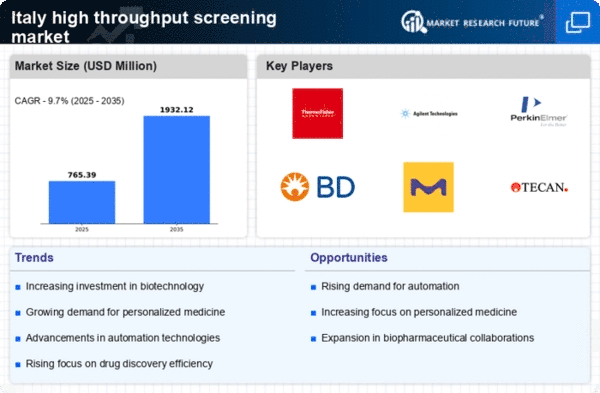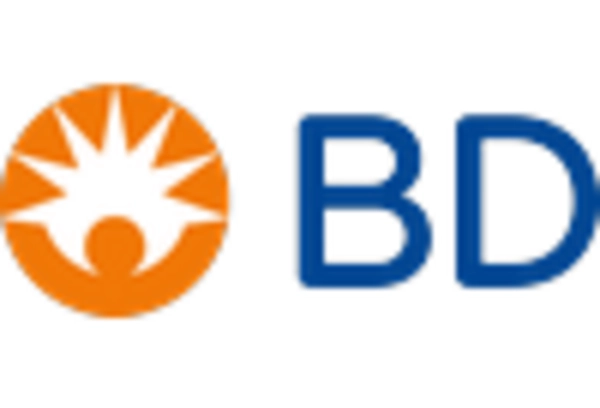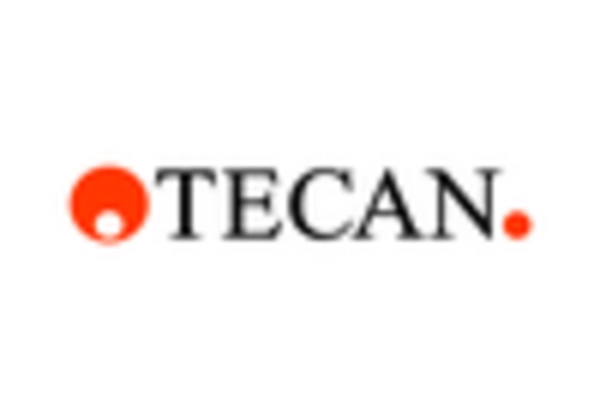Increased Focus on Biologics
The high throughput-screening market is witnessing a shift towards biologics, driven by the growing prevalence of chronic diseases and the demand for targeted therapies. In Italy, the biologics segment is projected to account for over 30% of the total pharmaceutical market by 2026. This trend is prompting pharmaceutical companies to invest in high throughput screening technologies that can efficiently evaluate biologic compounds. The ability to screen large libraries of biologics rapidly is essential for identifying promising candidates for further development. Consequently, the high throughput-screening market is likely to expand as companies adapt their strategies to focus on biologics, thereby enhancing their product pipelines.
Rising Demand for Drug Discovery
The high throughput-screening market in Italy is experiencing a notable increase in demand driven by the pharmaceutical industry's need for efficient drug discovery processes. As the complexity of diseases rises, the necessity for rapid screening of compounds becomes paramount. In 2025, the Italian pharmaceutical sector is projected to invest approximately €1.5 billion in research and development, with a significant portion allocated to high throughput screening technologies. This investment is likely to enhance the capabilities of laboratories, allowing for the evaluation of thousands of compounds simultaneously. Consequently, the high throughput-screening market is expected to expand as companies seek to streamline their drug development pipelines, thereby reducing time to market and associated costs.
Government Initiatives and Funding
Government support plays a crucial role in the growth of the high throughput-screening market in Italy. Various initiatives aimed at fostering innovation in biotechnology and pharmaceuticals are being implemented. For instance, the Italian government has allocated €300 million in funding for research projects that incorporate high throughput screening methodologies. This financial backing not only encourages the adoption of advanced technologies but also stimulates collaboration between academic institutions and industry players. As a result, the high throughput-screening market is likely to benefit from increased research activities and the development of novel screening platforms, ultimately enhancing the competitiveness of the Italian biotech sector.
Integration of Artificial Intelligence
The integration of artificial intelligence (AI) into the high throughput screening market is transforming the landscape of drug discovery in Italy. AI technologies are being utilized to analyze vast datasets generated from screening processes, enabling researchers to identify potential drug candidates more efficiently. In 2025, it is estimated that AI-driven solutions could reduce the time required for data analysis by up to 40%. This advancement not only accelerates the screening process but also enhances the accuracy of predictions regarding compound efficacy. As AI continues to evolve, its application in high throughput screening is expected to drive market growth, positioning Italy as a leader in innovative drug discovery methodologies.
Emergence of Startups and Innovation Hubs
The emergence of startups and innovation hubs in Italy is significantly impacting the high throughput-screening market. These entities are often at the forefront of developing novel screening technologies and methodologies. In recent years, Italy has seen a surge in biotech startups, with over 200 new companies established in the last two years alone. Many of these startups are focusing on high throughput screening solutions, which are essential for modern drug discovery. The collaborative environment fostered by innovation hubs encourages knowledge sharing and accelerates the development of cutting-edge technologies. As a result, the high throughput-screening market is poised for growth, driven by the innovative contributions of these emerging players.
















